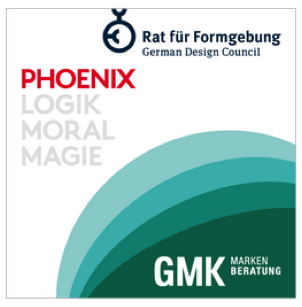Brand goes digital: Fellowship program on digital brands with Phoenix Design, GMK Markenberatung and the German Design Council
The Diesel Kuratorium’s fellowship program for the protection of digital brand personalities was presented at the CTO spring forum at Google and at the graduate college at Festo. This program is accompanied by the German Design Council, an initiative of the German Bundestag and a foundation of German industry, as well as Phoenix Design and the brand experts from GMK.
 Strong brands change our behavior and secure companies profitable positions in international competition. Companies invest in the communication of their brand in order to generate relevance and credibility with the target groups and to create differentiation from the competition. The understanding of brands is no longer a fixed brand image with rigid messages, but a flexible, essentially constant interaction pattern that interacts with customers primarily via digital channels. It is the multisensory experience that is permanently imprinted on the memory and thus manifests itself as a strong brand.
Strong brands change our behavior and secure companies profitable positions in international competition. Companies invest in the communication of their brand in order to generate relevance and credibility with the target groups and to create differentiation from the competition. The understanding of brands is no longer a fixed brand image with rigid messages, but a flexible, essentially constant interaction pattern that interacts with customers primarily via digital channels. It is the multisensory experience that is permanently imprinted on the memory and thus manifests itself as a strong brand.
For companies, it is important to generate these brand moments along the customer journey, to shape them and to exclude them from the competition in order to suppress imitation at this sensitive point. Brand added value is also created in digital worlds of experience through design and must be protected all the more assertively and sustainably in this particularly easy-to-copy form.
The aim of the fellowship program is to work on the topic: “Suppression of copying by IP, for design-based added value in brand experiences for digital products and services”.
In the article “The brand in the age of digitization”, Prof. Dr. Wurzer explains the challenges of brands in digital worlds of experience.
 Andreas Diefenbach, Member of the Board, Phoenix Design and member of the Advisory Board of the Diesel Board of Trustees, accompanies the fellowship program from the design perspective. For him, product developers for digital products and worlds of experience have to ask more and more the “why” question and designers have to better understand how new products get onto the road. In digital eco-systems, the increasingly intelligent products must primarily take care of people and their interactions with the product. Digitization leads from the product experience to the user experience that has to be designed. According to Andreas Diefenbach, it’s not just about what the user does with the product, but above all what the product does with the user.
Andreas Diefenbach, Member of the Board, Phoenix Design and member of the Advisory Board of the Diesel Board of Trustees, accompanies the fellowship program from the design perspective. For him, product developers for digital products and worlds of experience have to ask more and more the “why” question and designers have to better understand how new products get onto the road. In digital eco-systems, the increasingly intelligent products must primarily take care of people and their interactions with the product. Digitization leads from the product experience to the user experience that has to be designed. According to Andreas Diefenbach, it’s not just about what the user does with the product, but above all what the product does with the user.
Here you can find the whole interview with Andreas Diefenbach, which was conducted on the sidelines of the CTO spring forum:

Hans Meier-Kortwig, Managing Partner, GMK Markenberatung accompanies the fellowship program from the perspective of brand management and strategy. For him, the goal of classic and digital brand management is identical: The brand wants to achieve a monopoly in the mind of the customer. However, in the digital world, the boundaries between products, services and communication are disappearing, which makes brand management more demanding. The question arises as to what brand management looks like in digital form from the point of view of the brand makers. If everyone is doing design thinking and user experience optimization, then there is no potential for differentiation at this point. Meier-Kortwig recommends Brand Design Thinking to achieve differentiation in customer perception. In doing so, companies have to ask themselves what is the territory that I want to occupy with my brand and which customer needs I can address and satisfy there. In digital eco-systems, brands have to be managed more holistically, which means that the corporate strategy and the brand strategy have to be aligned with one another.
Here you can find the entire interview with Hans Meier-Kortwig, which was conducted on the sidelines of the CTO spring forum:



